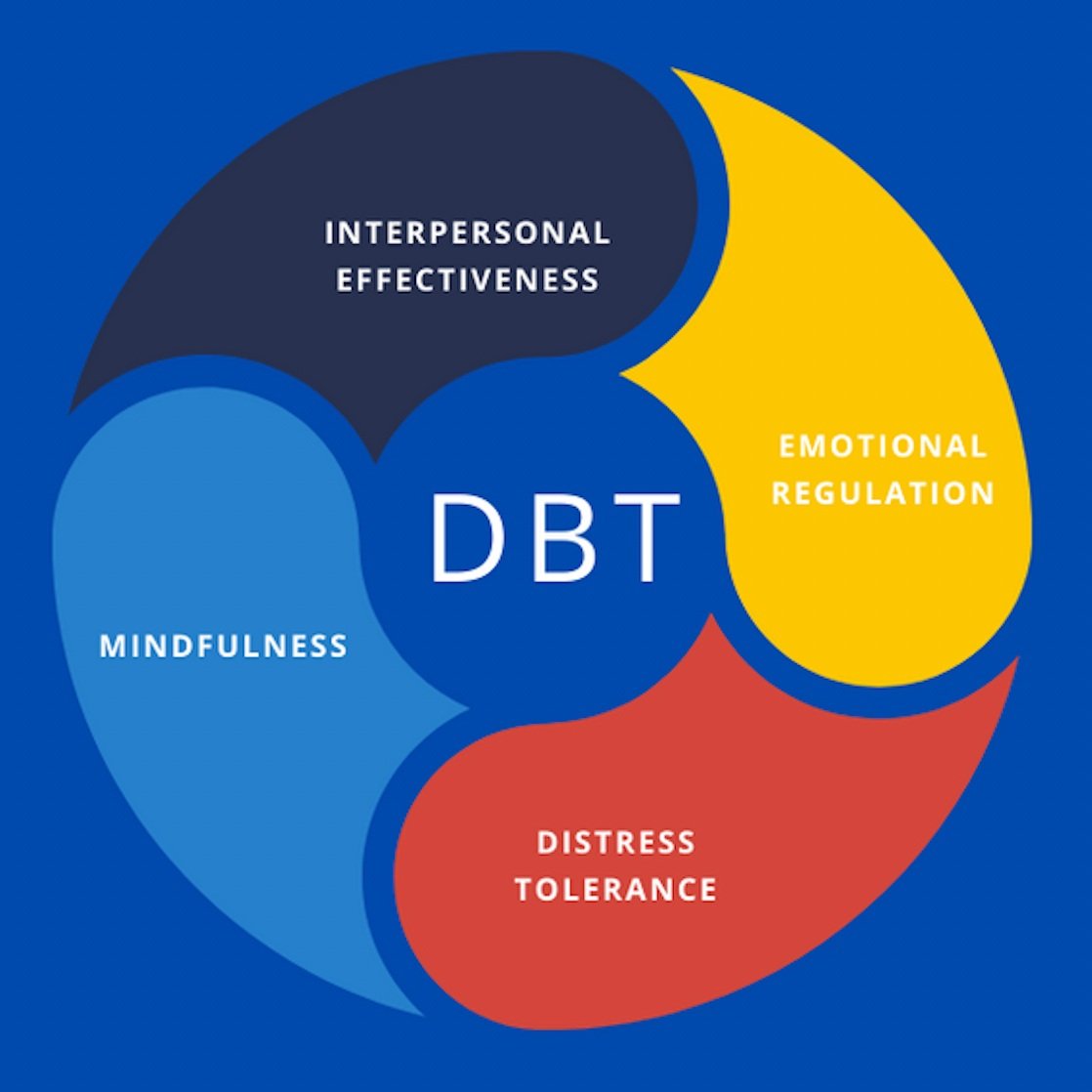Harnessing the Power of Dialectical Practices Treatment (DBT) Services for Lasting Psychological Balance and Improved Relationships
In a globe where psychological well-being and preserving healthy relationships are important elements of a meeting life, the application of Dialectical Practices Therapy (DBT) solutions has actually become a beacon of expect lots of people. The structured and evidence-based technique of DBT offers a pathway towards lasting emotional equilibrium and improved interactions with others. By focusing in on core principles, people can establish crucial abilities for controling feelings, improving social effectiveness, and cultivating mindfulness. The real power of DBT exists not simply in recognizing these principles but in the functional application of strategies in everyday life. As we navigate the complexities of human feelings and relationships, harnessing the possibility of DBT services ends up being a transformative trip worth discovering even more.

Recognizing the Core Concepts of DBT
Dialectical Habits Therapy (DBT) is started upon a set of core concepts that underpin its restorative method to advertising emotional equilibrium and mental health. Among the essential concepts of DBT is dialectics, which highlights the synthesis of relatively contrary concepts to reach a more well balanced perspective. This includes recognizing and accepting the oppositions and stress within oneself, causing a better sense of harmony and understanding. Mindfulness is an additional core principle of DBT, concentrating on being fully present in the moment without judgment. By cultivating mindfulness, individuals can develop an increased understanding of their emotions, habits, and ideas, permitting higher self-regulation and psychological control.

Validation is additionally essential to DBT, emphasizing the relevance of acknowledging and accepting one's experiences and feelings as valid. By including these core concepts into treatment, DBT offers a thorough and efficient technique to promoting psychological well-being and psychological resilience.
Establishing Emotional Policy Abilities
Psychological regulation abilities are essential elements of Dialectical Actions Treatment (DBT) that make it possible for people to successfully handle their feelings and navigate challenging circumstances with strength. These skills incorporate the capability to determine and understand one's emotions, tolerate distress, control extreme feelings, and act in conformity with individual worths also in the face of emotional chaos. Creating emotional regulation skills involves discovering mindfulness methods to remain present in the moment, comprehending the triggers that cause emotional dysregulation, and carrying out coping approaches to modulate psychological actions.

Enhancing Interpersonal Efficiency
Improving communication abilities and promoting purposeful links with others are important facets of developing social effectiveness within the framework of Dialectical Behavior modification (DBT) In DBT, improving interpersonal efficiency entails finding out how to assertively reveal one's requirements and boundaries while also thinking about the requirements and borders of others. This skill is critical for reducing and constructing healthy relationships dispute. DBT educates individuals how to connect effectively, browse social difficulties, and create strategies for resolving conflicts in a constructive fashion.
One secret component of boosting social efficiency in DBT my review here is learning to Full Report identify and handle emotions in social interactions. DBT London. By boosting emotional recognition, individuals can react to others in a much more compassionate and understanding method. Additionally, DBT stresses the relevance of exercising mindfulness in social partnerships, urging people to be existing in their communications and fully engage with others
Practicing Mindfulness Techniques
Creating a regular mindfulness practice is important for individuals undergoing Dialectical Actions Therapy (DBT) to cultivate psychological guideline and improve their interpersonal efficiency. Mindfulness techniques, a core part of DBT, include taking notice of today moment without judgment. With mindfulness, people can become extra mindful of their ideas, emotions, and physical experiences, allowing them to reply to circumstances with greater clarity and control.
One key mindfulness method utilized in DBT is mindfulness reflection. This method entails focusing on the breath or a particular item while allowing and acknowledging go of any distracting ideas. By integrating mindfulness reflection right into their day-to-day routine, individuals can train their minds to remain existing and decrease reactivity to stressors.
One more vital facet of exercising mindfulness in DBT is the principle of extreme approval. Radical acceptance involves completely embracing reality as it is, even you can look here when it is difficult or agonizing. By accepting the here and now moment without judgment, individuals can decrease their suffering and make room for favorable adjustment.
Using DBT Approaches in Daily Life
Building upon the foundation of mindfulness methods such as reflection and radical acceptance, individuals can integrate DBT techniques into their every day lives to promote psychological equilibrium and improve their interpersonal abilities. One effective DBT technique is the use of dialectics, which motivates people to locate the happy medium in between two opposing ideas or emotions. By exercising dialectics in day-to-day interactions, individuals can discover to verify their very own sensations while also thinking about the perspectives of others. An additional crucial DBT ability for every day life is distress resistance, which includes finding out how to cope with intense emotions without considering dangerous behaviors. This can be achieved through methods such as self-soothing tasks, disturbance techniques, or improving the moment. Additionally, social performance abilities taught in DBT can help individuals interact their needs assertively, set borders, and keep healthy and balanced connections. By constantly applying these DBT methods in day-to-day live, people can experience lasting emotional equilibrium and boost their total health.
Final Thought

Psychological law abilities are important elements of Dialectical Habits Therapy (DBT) that allow individuals to efficiently manage their feelings and browse challenging scenarios with strength.Via DBT solutions, people can grow a much deeper awareness of their feelings, identify patterns of actions that add to psychological distress, and get functional tools to manage their sensations constructively.Developing a constant mindfulness method is essential for people undergoing Dialectical Actions Treatment (DBT) to grow psychological law and improve their interpersonal effectiveness.Structure upon the structure of mindfulness strategies such as reflection and radical acceptance, individuals can incorporate DBT methods into their day-to-day lives to promote emotional balance and enhance their social abilities. By understanding the core principles of DBT, developing psychological regulation skills, enhancing interpersonal efficiency, practicing mindfulness techniques, and using DBT strategies in daily life, individuals can experience substantial renovations in their total wellness and partnerships.
Comments on “Changing Lives: DBT London's Holistic Technique to Recovery”